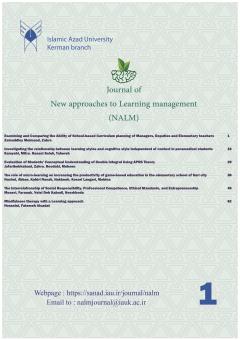Examining and Comparing the Ability of School-based Curriculum Planning of Managers, Deputies and Elementary Teachers in Bardsir City (A case study)
Subject Areas : Educational Science
1 - Associate Professor, Department of Educational Sciences and Psychology, Kerman Branch, Islamic Azad University, Kerman, Iran
Keywords: Attitude, Skills, Knowledge, School-centered, School-based Curriculum,
Abstract :
Introduction: Scientific curriculum development is the guarantee of the successful learning of learners. This research was formed with the aim of investigating and comparing the capability of school-based curriculum planning of principals, deputies and teachers of primary schools in Bardsir city. Based on the purpose of this research, the present research method has been comparative.
Methodology: In order to evaluate and compare the ability of the target groups from the implementation of school-based curriculum, four variables of knowledge, attitude, skills and facilities in three groups of school principals, deputies and teachers were assessed. In order to measure the mentioned variables, four components of selection, change, completion and compilation in the school-based curriculum have been identified and the questions have been tried to include the measurement of all four levels. In addition, questions were raised that could measure focus. The statistical population of this study was all managers with 50 people, 300 teachers and 30 deputies in the primary school of Bardsir city in the academic year of 2020-2019. According to the estimation table and the sample size of the mother population, the sample size was 190 people (25 principals, 15 deputies and 150 teachers). The sampling method was stratified. School-based course "Maleki (2006). The statistical methods used included descriptive and inferential statistics (Chi-square test, Pearson correlation coefficient test).
Findings: Using SPSS21 statistical software, the research findings indicate the studied groups have sufficient knowledge, negative attitude and insufficient skills in the implementation of school-based curriculum and elementary schools in Bardsir have suitable facilities to implement this tradition. they have not.
Conclusion: The research showed though the time and conditions for decentralized and school-centered curriculum planning have not yet come, it is suggested to prepare training courses with the aim of improving the knowledge, attitude and curriculum planning skills of the school education system practitioners, especially teachers as true reformers Curriculums to improve the effectiveness of school curricula.
AdibManesh, M., Ali Asgari, M., & Mosapour, N. (2012). The Feasibility Study of the Implementation of School – Based Curriculum Development in Kermanshah High schools. Journal of Curriculum Research, 1(2), 81-104. https://doi.org/10.22099/jcr.2012.251
Ahmadi, m., salehi, m., Amirianzadeh, M., & Ahmadi, E. (2022). Designing of school-centered model by mixed exploratory research method. Strategic Management Thought, 16(4), 103-136. https://doi.org/10.30497/smt.2023.244015.3440
Chavoshi Hosseini, L., Etemad Ahri, Alaoddin, & Saber Gorkani, Afsaneh. (2023). Presentation of school curriculum model based on social, cultural and psychological needs of secondary school students. ISLAMIC LIFE STYLE CENTERED ON HEALTH, 7(2), 460-473. https://doi.org/https://sid.ir/paper/1134574/en
fariabi, m., kamali, n., & davodi, r. (2021). Designing and explaining the native school-based management model from the perspective of the document of fundamental change in education. Strategic Management Thought, 15(2), 127-164. https://doi.org/10.30497/smt.2022.12886.2789
Fisser, P., & Strijker, A. (2019). Digital Literacy as Part of a New Curriculum for the Netherlands. In Handbook of Research on Media Literacy Research and Applications Across Disciplines (pp. 193-203). IGI Global.
Gholamzadeh, F., Akbari Burang, M., & Ayati, M. (2023). Teachers' perception of values education curriculum in the first year of elementary school. Research in Islamic Education Issues, 30(57), 259-292. https://iej.ihu.ac.ir/article_207712_c1819ec42e7db70737ad3aac969cbeac.pdf
Hemmatyar, M. b., Bahadori, S., & Ashrafi, F. (2020). Investigating the Dimensions of School Independence (School-Centered Idea): Analyzing the Experiences and Opinions of Elementary Schoolsʼ principals. Research in Elementary Education, 1(2), 71-79. https://reek.cfu.ac.ir/article_1095_e463b1f5f373d6ca97687e22593d6e28.pdf
Karami, R., & Nasiri, F. (2019). Investigating the relationship between school-oriented management style and teachers' job success and job adaptability. Journal of School Administration, 8(1), 283-301.
Kazemi, M., Moazami, M., & mohammadi moghadam, y. (2022). Identifying the dimensions and components of the elitism process in elementary schools of Iran country. Educational Development of Judishapur, 13(0), 87-99. https://doi.org/10.22118/edc.2022.357673.2152
Mizrak, S. (2024). Examination of The Relationship Between Teachers’ Occupational Commitment and Job Satisfaction According to Various Variables. Cypriot Journal of Educational Sciences, 19(4), 420-434. https://doi.org/https://doi.org/10.18844/cjes.v19i4.9210
Mousapour, N. (2010). Dos and don'ts in the curriculum planning system of Iran. Publications of Shahid Bahonar Kerman Faculty of Literature and Humanities, 2(2), 20-28.
Piri, M., & Behrozitabar, K. (2016). Feasibility of School-Based Curriculum Development in the Education System from the Standpoint of Educational Experts. Journal of Curriculum Research, 5(2), 1-22. https://doi.org/10.22099/jcr.2016.3833
Rashidi, B., Abedi, A., & Noruozi, G. (2022). Developing the Curriculum Enrichment Model for Gifted and Talented School in Iran: A Grounded Theory Study. Journal of Curriculum Studies, 17(66), 259-288. https://www.jcsicsa.ir/article_150257_ba67f18bcf98aa4ee18ad7491a5f5e6e.pdf
Samadi, P. (2016). Model of school-based curriculum development.
Zeinaddiny Meymand, Z. (2015). Curriculum planning process with emphasis on higher education and university curriculum planning. Publications of Islamic Azad University of Kerman, 1, 280-312.
Zeinaddiny Meymand, Z. (2020). Study the Effectiveness of complementary and extra curriculum activities on students’ self-belief. Biannual Journal of Education Experiences, 3(2), 1-12.
Zeinaddiny Meymand, Z., & Sharifi, P. (2019). The Role of Job Motivation in Faculty Members’ Participation in Curriculum Development. Strides in Development of Medical Education, 16(1).


